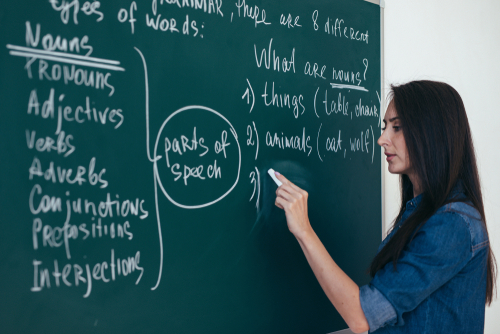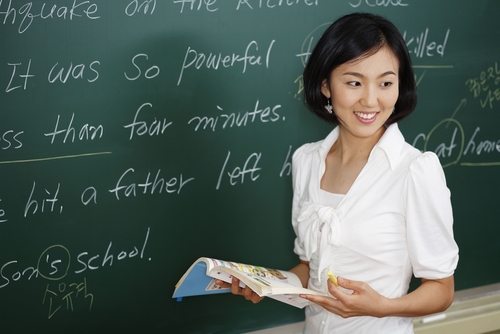
A high school teaching position is a great deal more specialized than a position teaching students in elementary school or in the middle grades. For English teachers, that means choosing from fields like literature, linguistics, and more. Unlike several other specialties for high school teachers, English is actually pretty broad It represents some of the most unique teaching possibilities based on the degree an aspiring teacher chooses.
Choosing the Right Program: Best Degrees for an English Teacher
Today’s students need to learn and understand everything from grammar to sound punctuation and the numerous ways to dissect a classic work of literature. English teachers can accommodate these students by choosing one of several available degree options:
B.A. in English
A broad bachelor’s degree in English will expose an aspiring teacher to:
- American and British literature
- basic linguistics
- courses that focus almost exclusively on the semantics of the English language
As a result, the English graduate will be able to help students:
- write better papers
- choose better sentence structure
- gain insight into an author’s work through careful exploration

B.S. in Linguistics
Some English teachers are more adept at dealing with matters of linguistic origin than they are at handling the various topics in a work of literature. That’s perfectly fine, and it’s why the linguistics field exists. Those who pursue this topic while at the undergraduate level will be excellent at teaching writing classes and classes in vocabulary,. They’ll also be able to help students prepare for the SAT and for their college pursuits.
B.S. in English Education
This combined program teaches students the essential skills they need to teach high school students about the rules and authors of the English language. That means going above and beyond content knowledge. Those who choose this major will also learn how to:
- manage a classroom
- handle students who are falling behind the rest of the class
- prepare a proper lesson, pacing guide, and more
Students will also engage in student teaching opportunities. These are instrumental when learning how to put their skills into practical, everyday use.
B.A. in Literature
This degree is the exact opposite of one in linguistics. Undergraduate students will explore literature intensely, with required courses and electives that focus on:
- American authors
- British authors
- international texts
- the future of the written word
The result is a new teacher who can effortlessly teach high school students about symbolism, themes, and even the implications of an author’s life on their work.
Dual Major in English and a Second Language
Though English is a broad topic, it’s generally not as in-demand as teaching positions that cover math, science, and technology. One way to stay competitive in a growing pool of English-teaching candidates is to choose a dual major. The second major should focus on a foreign language like Spanish. At the end of the program, graduates can opt to be dual-certified for teaching both English and the language of their choice. This gives them more ways to:
- serve students
- compete for job positions
- provide context for each of their specialties
B.A. in Education Studies
Many students who enter college aren’t sure what they want to study. Those interested in teaching can earn a B.A. in Education Studies. This degree prepares them for teaching students and getting their licenses in specific states. Though these programs do not include courses designed specifically for English teachers, they can help graduates work in those classrooms. Many education studies programs feature concentrations that get students ready for teaching young kids or older teens as well as adults. They learn how to:
- design a curriculum
- create a reading list
- determine assignments
- grade their students’ work
B.S. in Middle Grade Education
The middle grades can refer to students in seventh and eighth grade. But schools can also educate students as young as sixth grade through ninth grade or the higher levels of high school. It depends on whether the school district has middle schools or junior-highs. The B.S. in Middle Grade Education programs prepares students to work with kids who already have some basic skills but need more help. Graduates often work as advisors for different clubs and activities such as the yearbook or school newspaper. The programs often ask majors to focus on two core areas, such as English and social studies or math and science. Graduates can then teach more than one subject.
B.S. in Secondary Education
Another popular option for some students is a B.S. in Secondary Education program, which gets them ready to work with high school students. Most undergrad degrees in teaching or English help students get a license to teach in their states. This type of degree shows that they have the skills necessary to work in a high school classroom. It usually features two years of required courses. Students can then customize their degrees to fit their future goals. Those who want to teach English will take classes in literature and similar topics. Many schools allow students to earn an English education endorsement, too.
B.S. in Teaching Reading
Certain students of all ages may need more help with their reading than their peers do. This is why some schools now offer degrees in teaching reading. Majors take standard elementary education courses but choose an emphasis on teaching reading. They learn some of the conditions and disabilities that make it hard for students to read and understand what they read. Many programs include one full year of reading courses. Others feature fewer of these classes and only allow students to take them once they complete their prerequisites. Graduates can work as both teachers and reading assistants who help students in the classroom or library.
B.S. in English Language Arts
The Core Standards that schools use identify English language arts as one of the key areas that students need to study. Those who earn a B.S. in English Language Arts will learn how to identify those key areas and teach them to their students. They will also monitor their work and spot any issues. Majors look at how to read books and then answer questions about what they read. These programs usually prepare students for working with both middle school and high school students. Some schools offer education programs with a concentration in English language arts.
B.A. in Teaching English for Early Childhood
Teaching English for Early Childhood programs are similar to Teaching English as a Second Language. They focuse on preparing students for working with young children who do not speak English. The teachers often work with kids who moved to the U.S. at a young age and do not have a good grasp of the language. Though the students may have some familiarity with the language, they are not on par with their peers. In addition to prerequisites and required courses, students take classes such as literature for children and reading instruction and assessment.
B.A. in Special Education
Students who have learning disabilities may need more help in high school than their peers do. They often have a hard time keeping up with their classes and focusing on simple tasks. Special-education programs help future teachers learn how to handle the complex needs of their students. These programs are sometimes available as dual degrees, in which graduates earn degrees in both teaching and special education. They often need to complete student teaching internships,. Here, they teach in local schools under the guidance of a licensed teacher. Many programs also ask the students to create portfolios and present them to show some of the work they did and what they learned.

M.A. in English
A master’s in English is a good option for those who finished their undergrad work in a different subject but want to teach English. They may need to take the GRE, submit their score, and provide any other information that the school needs. Students can choose the concentration that matches their goals, such as teaching reading or a second language. An introductory class on the English language is one of the first courses that they take. They’ll then look at modern literature and romantic literature, along with courses on teaching methods. These programs can help students get their teaching licenses when they don’t have an education undergrad degree.
M.A. in English Literature
Teachers who hope to earn money and want to advance their studies may earn a degree in English literature. Designed for those who want to study literature in a more in-depth manner, the programs are available both online and on campus. Students usually spend two years taking classes to learn about some of the top writers in history. They also have the chance to study rhetoric and criticism of popular writers. Many of these programs also include classes for students who want to teach. Not only do they learn how to work with students of different ages, they also look at how to handle reading issues.
M.S. in Education
There are also M.S. in Education programs designed for students looking at how to become a high school English teacher. These programs are suitable for students who already have an undergraduate degree. They often include concentrations such as educational leadership, which focuses on the education system in America and how different students respond to different teaching methods. Majors also look at childhood development and how high school students change as they age. Students have the chance to take advanced English courses that prepare them to help students understand challenging topics, such as renaissance literature and the works of Shakespeare.
Master of Teaching and Learning
A few colleges offer graduate degrees in teaching and learning that can prepare students for working with those studying English in high school. Students can often complete one of these programs in as little as 12 months. They look at the foundations of graduate study and the fundamentals of teaching in the digital age. Majors can focus on working with students in online settings as well as in traditional classrooms. Graduates can work as lead teachers, teaching assistants, coaches, and mentors. Most programs allow students to take classes from both the English and education departments of the college.
M.ED. in Reading Education
Interested in being a high school English teacher focuses on reading? You might select a reading education program. These are Master of Education programs that include a concentration in reading education. Students learn how to identify reading and learning disabilities in others, such as ADHD and dyslexia. They also learn how to teach students with those problems all aspects of English, from reading and understanding what they read to writing short stories and creating nonfiction papers. Some schools also offer these degrees through Master of Science in Reading Education programs.
Becoming a High School English Teacher

According to the Bureau of Labor Statistics, high school teachers make a median wage of $62,870 per year. The amount that college graduates make will depend on:
- what they want to teach
- where they live
- the type of school they teach in
- how much experience or education they have
Those who teach in private schools often earn more than teachers at a public school do. Before they finish college, students should check on the requirements for teachers in the state or states where they want to teach. Most states require that teachers have an undergraduate degree and pass a background check. Prospective teachers may need to take a test designed by the state, too.
Alternatives to Teaching Degrees
Not everyone who looks at how to become a high school English teacher wants to go back to school or earn an advanced degree. They may find some of the alternatives to traditional teaching degrees helpful. Teach for America and Teach for All offer programs that hire college graduates and others to work as teachers. Teachers may not have a choice on what they teach, but it gives them enough experience to get a teaching license when they get home. Many states also have alternative paths for those who have degrees in fields other than education or English to help locals become teachers. They often need to complete a short certification program that builds on the skills and knowledge they already have. The certification programs can take as little as a year or less to finish.
English Teachers Have Plenty of Good Options
From literature and linguistics to foreign languages and beyond, today’s undergraduate students have many ways to pursue the knowledge and experiences necessary to land a rewarding teaching position. Be sure to choose the program that is both interesting to study and relevant to today’s schools, and success will be a bit easier to find.
By BDP Staff
Related Resources:
- 30 Great Small Colleges for a Teaching Degree
- What is the Difference Between a BA and a BS?
- 30 Best Online Bachelor’s in Special Education
- Top 10 Highest Paying Careers in Education
